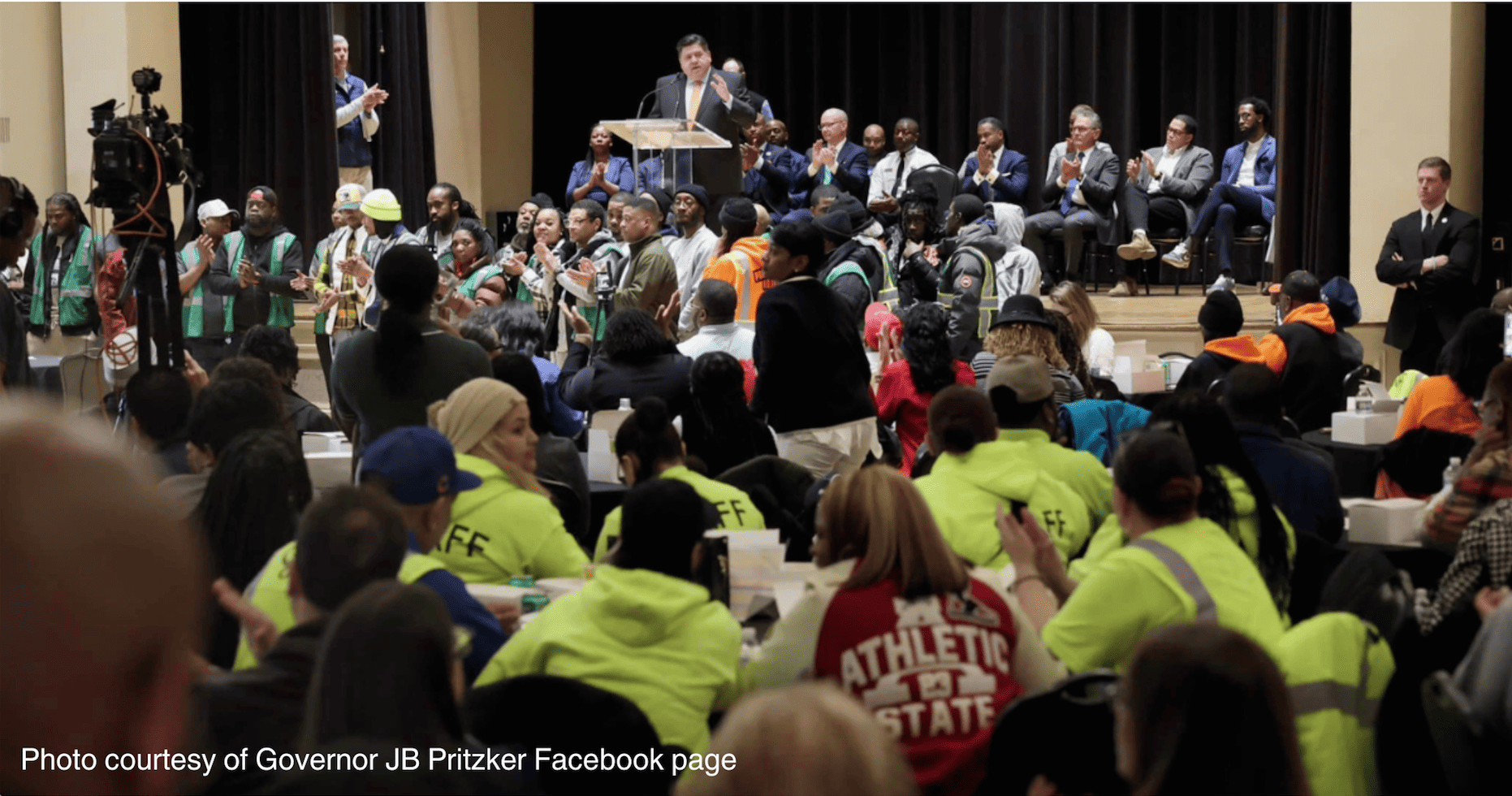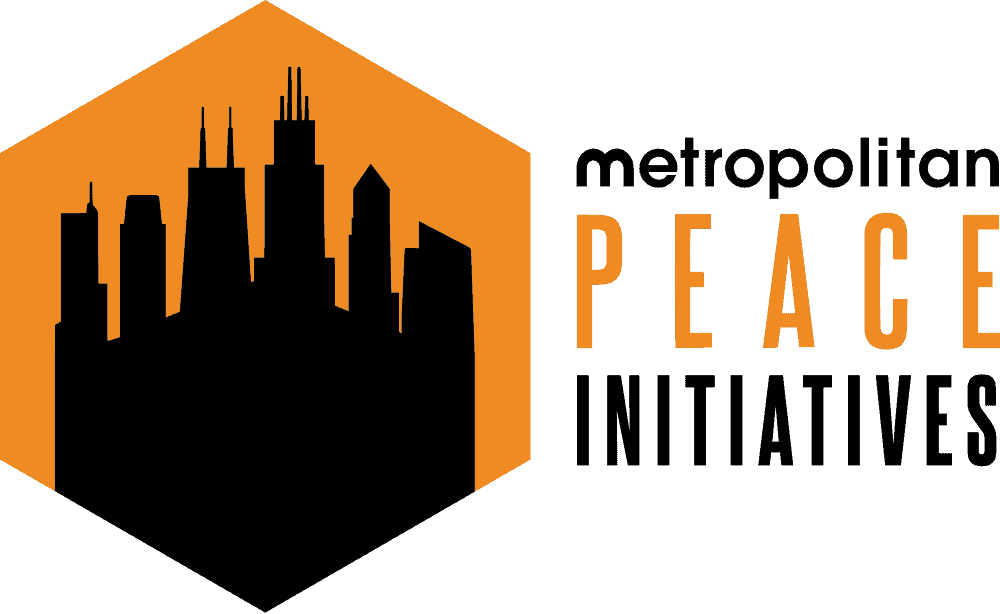Community Violence Intervention Groups Announce Scaling Efforts to Reduce Gun Violence in Chicago

Community violence intervention (CVI) groups gathered with philanthropic, business, and government leaders at an annual convening on Thursday, February 1, 2024, to announce plans to expand CVI programs in Chicago to help reduce gun violence.
The midday gathering took place at the South Shore Cultural Center with more than 300 guests, including Governor JB Pritzker, Chicago Police Department Superintendent Larry Snelling, Illinois Senate President Don Harmon, Illinois House Speaker Emanuel “Chris” Welch, Cook Country Chief of Staff Lanetta Haynes-Turner (on behalf of Cook County Board of Commissioners President Toni Preckwinkle), State Senator Robert Peters, State Rep. Curtis J. Tarver II, State Rep. Justin Slaughter, and others.
Metropolitan Peace Initiatives (MPI) Executive Director Vaughn Bryant and Chicago CRED Founder Arne Duncan unveiled the plan entitled “Scaling Community Violence Intervention for a Safer Chicago” or “SC2.” In collaboration with the Partnership for Safe and Peaceful Communities (PSPC) and the Civic Committee of the Commercial Club of Chicago, SC2 is expected to roll out over the next decade with coordinated efforts from community-based and citywide stakeholders as well as city, county and state governments.
In 2024, there is a goal to increase CVI programs in up to three neighborhoods around Chicago. Additional programs will be added as funding becomes available and community organizations build capacity.
“This is a truly unprecedented level of collaboration and should make us all proud. This is really the one table that we’ve all been talking about,” Bryant said, noting that Chicago has seen two years in a row of double-digit declines in shootings.
“No other city in America has put together this kind of public-private partnership to achieve such a transformative reduction in gun violence.”
Duncan added, “We have a chance—I honestly believe in my heart—to make history over the next three, four, five years. We can dramatically bring down violence together, all of us together. We can do something that hasn’t been done for far too long. This is an unprecedented effort that’s so critical for our children, for our communities, for our city. This can be a national model.”
Areas of focus include East and West Garfield Park, Little Village, Humboldt Park, New City, Englewood, Austin, and North Lawndale (where a neighborhood collaboration has been underway since 2022). These communities were chosen based on rates of violence and consideration of geographic and racial equity.
Over the next five years, CVI leaders and professionals hope to serve at least half of the estimated 20,000 Chicagoans at highest risk of shooting or being shot, while reducing shootings and homicides by 50 percent. The ten-year goal is to serve 75 percent, while reducing shootings and homicides by 75 percent.
CVI approaches include street outreach, behavioral health, workforce development, legal aid, and organizational development. Currently, it is estimated only 15 to 20 percent of those at highest risk receive services from about two dozen CVI organizations currently active in 37 neighborhoods of Chicago.
Bringing the plan to scale in the first seven communities over the next five years is estimated to cost around $400 million. However, approximately half of that amount is already accounted for through public and private sector budgets.
Governor Pritzker spoke on the work his administration has already put forth to help reduce violent crime across the state, which included the passage of the Protect Illinois Communities Act in 2023. This act placed a ban on the sale of assault weapons, ghost guns, rapid-fire switches, and high-capacity magazines, while also instituting universal background checks on all gun purchasers and increasing the duration of “red flag” laws.
He explained SC2 as the next phase in keeping Chicagoans safe.
“With this announcement today, SC2, we are bound to make even more progress saving countless lives. SC2 will carry this work much further,” Governor Pritzker said. “Scaling Community Violence Intervention for a Safer Chicago is an unprecedented effort to gather government stakeholders, community organizations, [and] private stakeholders to meet the needs of those most at risk of gun violence.”
Institute for Nonviolence Chicago (INVC) Director of Community Violence Intervention Sam Castro was a shining example of those leading the way through his lived experiences. Formerly incarcerated, he turned his life around by becoming an outreach worker before being promoted up the ranks to his current position at the organization.
He spoke to guests as a voice from the field, specifically thanking outreach workers for their selfless efforts in making their communities safer.
“To my CVI field, I want to acknowledge the incredible work that we do in the late-night hours in those dark alleys, mediating and de-escalating conflicts. This is the work that no one sees. It’s dangerous and takes an incredible amount of courage,” Castro said. “[…] I challenge myself and everyone in this room to push ourselves to raise the bar of dedication so that we can pass the number of reductions that we have seen in the last few years.”
MPI currently works with 15 organizations which make up Communities Partnering 4 Peace (CP4P), a coalition of non-profit organizations focused on gun violence prevention across 28 Chicago neighborhoods. Its strategy consists of four core pillars: a philosophy of nonviolence, trauma-informed care, hyperlocal collaboration, and restorative justice.
A 2023 report from the Center for Neighborhood Engaged Research and Science (CORNERS) found that CP4P had an impact in Chicago from July 2017 to December 2021 in reducing gun violence in Chicago. Key findings from the evaluation showed that CP4P: reaches the right people; lowers rates of gunshot victimization among participants; improves access to employment, education, and other services; and leads to safer neighborhoods.
